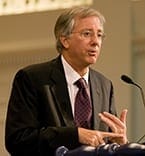By Program

A Conversation with Ambassador Dennis Ross
February 12, 2020 | 12:15 pm | Bass Lecture Hall, LBJ School of Public Affairs

On Wednesday, February 12, 2020, the Strauss Center and Clements Center hosted Ambassador Dennis Ross, William Davidson Distinguished Fellow at The Washington Institute and former special assistant to President Barack Obama, for a discussion on his recently published book, Be Strong and of Good Courage: How Israel’s Most Important Leaders Shaped Its Destiny. After introductory remarks by Professor William Inboden, Ambassador Dennis Ross began by unpacking the title of his book, noting that the latter portion of the title— “of Good Courage”— refers to what the Ambassador views as a threat to the character of Israel; namely, the increasing likelihood that it will become one state for two people. In order to avoid this outcome, he argued, it is imperative that Israel stop building outside of the settlement blocs, a pattern which precludes the possibility of peace. The reason this has yet to happen is that such a policy shift would require a type of political courage which is not characteristic of the current Israeli Prime Minister.
This transitioned neatly to a discussion of the main premise of Ambassador Ross’s book, which he characterized as “four profiles of courage of Israeli Prime Ministers.” These four— who he referred to as “modern Israel’s founding fathers”—are David Ben-Gurion, Menachem Begin, Yitzhak Rabin, and Ariel Sharon. Each of these leaders exemplify how to pursue the preservation of Israel’s character as a Jewish, Democratic state, and further illustrate the courage required to make tough decisions in the pursuit of peace. He spoke of his personal experience with all four, and highlighted that each of them understood the importance of leading the people, rather than following the people. As such, they all placed a high premium on public education. Similarly, each recognized the costs of action, inaction, and understood what responsibility meant: putting the state first.
Ambassador Ross then discussed the strengths and shortcomings of the Trump administration’s peace plan. On the strengths side, the plan embraced the a two-state outcome. As for shortcomings, Ambassador Ross noted that the failure to include the leading regional Sunni states in a meaningful way in advance of the plan’s public release constituted a major missed opportunity. Further, he argued, the plan was too easy for the Palestinians to say no to, and its lack of reasonable Palestinian concessions did not make it serious basis for further peace negotiations.
Biography
Ambassador Dennis Ross is counselor and William Davidson Distinguished Fellow at The Washington Institute for Near East Policy. For more than twelve years, Amb. Ross played a leading role in shaping U.S. involvement in the Middle East peace process, dealing directly with the parties as the U.S. point man on the peace process in both the George H. W. Bush and Bill Clinton administrations. He served two years as special assistant to President Obama and National Security Council senior director for the Central Region, and a year as special advisor to Secretary of State Hillary Rodham Clinton.
Prior to his service as special Middle East coordinator under President Clinton, Amb. Ross served as director of the State Department’s Policy Planning Staff in the first Bush administration. He played a prominent role in U.S. policy towards the former Soviet Union, the unification of Germany and its integration into NATO, arms control negotiations, and the 1991 Gulf War coalition. During the Reagan administration, he served as director of Near East and South Asian affairs on the National Security Council staff and deputy director of the Pentagon’s Office of Net Assessment.
A graduate of UCLA, Amb. Ross wrote his doctoral dissertation on Soviet decision-making, and served as executive director of the Berkeley-Stanford program on Soviet International Behavior. He received UCLA’s highest medal and has been named UCLA alumnus of the year. Amb. Ross is the author of five books on the peace process, the Middle East, and international relations, most recently Be Strong and of Good Courage: How Israel’s Most Important Leaders Shaped Its Destiny (PublicAffairs, 2019), written with his colleague David Makovsky, which was published in September of this year. It provides profiles of four Israeli prime ministers who made historic choices and explores the lessons from those decisions to see if they can provide a guide to dealing with the fateful choice that Israel’s leaders must soon confront or by default become a binational state.
Previously, Amb. Ross authored Doomed to Succeed: The U.S.-Israel Relationship from Truman to Obama (Farrar, Straus, and Giroux, 2015). That book was awarded the 2015 National Jewish Book Award for history. He also co-authored Myths, Illusions, and Peace: Finding a New Direction for America in the Middle East (Viking, 2009) with Mr. Makovsky. An earlier study, The Missing Peace: The Inside Story of the Fight for Middle East Peace (Farrar, Straus, and Giroux, 2004), offers comprehensive analytical and personal insight into the Middle East peace process. The New York Times praised his 2007 publication, Statecraft, And How to Restore America’s Standing in the World (Farrar, Straus, and Giroux, 2007), as “important and illuminating.”


